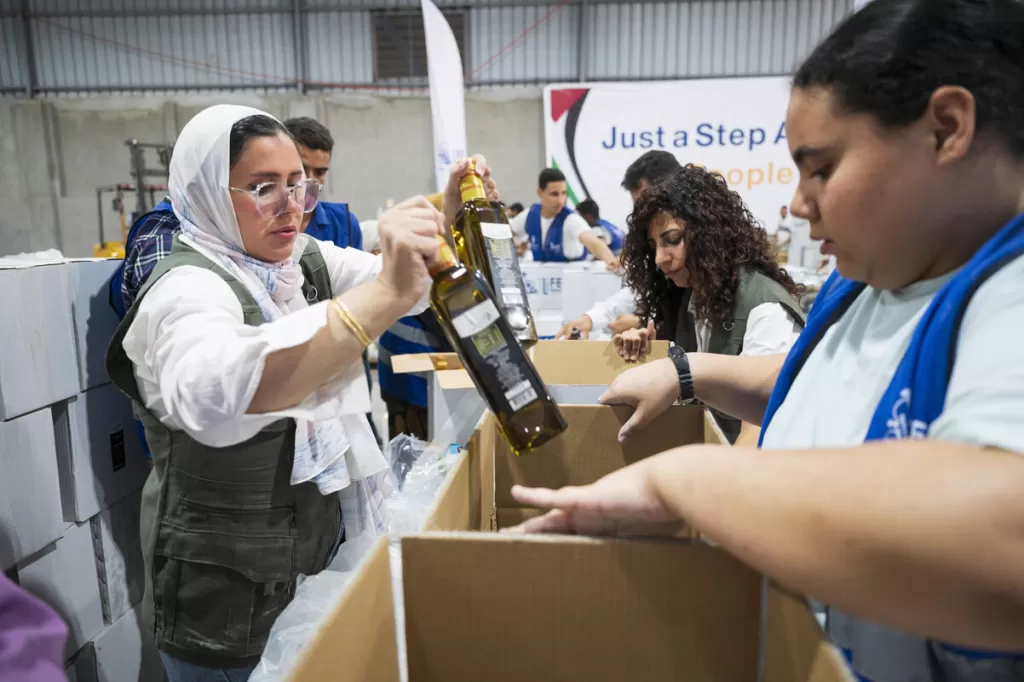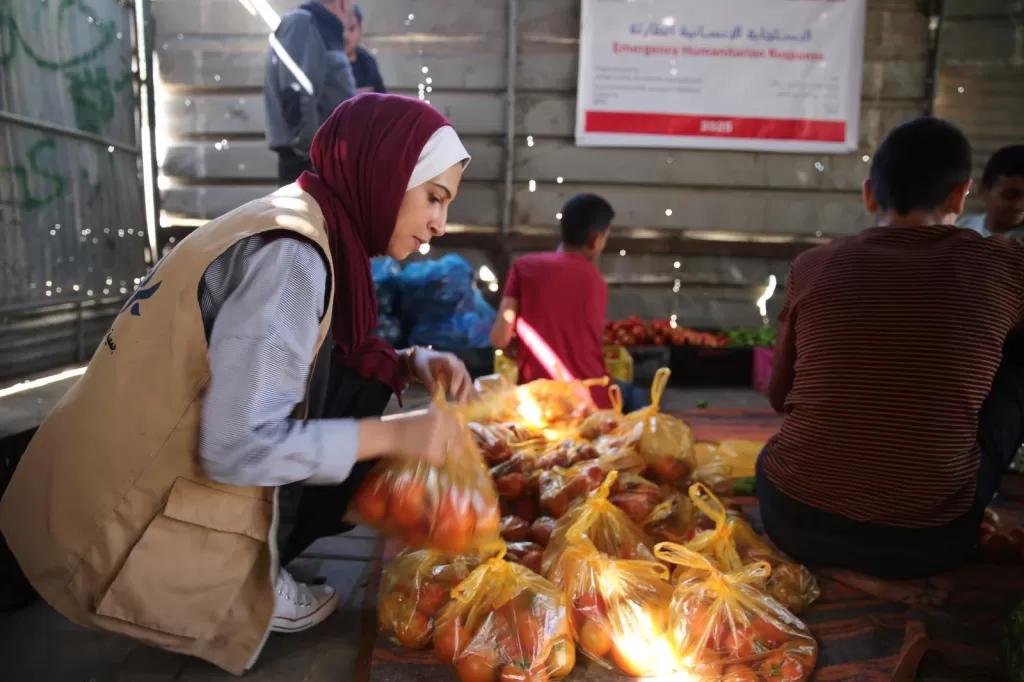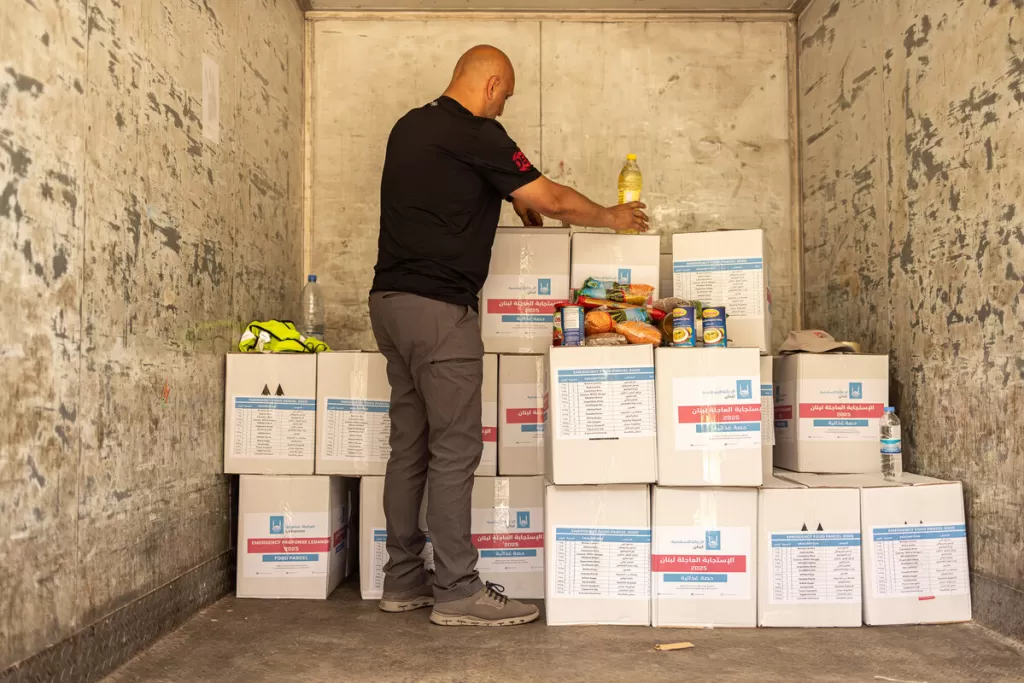
Conflict in the Middle East has devastated lives across the region, and millions have fled their homes and are in need of urgent support. The ceasefire agreement in Gaza provides desperately needed hope and relief for so many people whose lives have been devastated by the conflict.
How donations are being spent
Currently DEC charities and their local partners are scaling up their work again, after months of extraordinary months delivering aid. Hundreds of trucks of food, medicine and essential supplies have started to enter Gaza, and more are expected to cross in the coming days.
Safe access for humanitarian aid is beginning to increase, and DEC charities and their local partners are adapting their programmes to deliver more food, water and medical care. Donations to the Middle East Humanitarian Appeal are helping support their vital work.
Here are some examples of how DEC charities have responded during the ceasefire so far:
- Several trucks belonging to the Red Cross have already entered Gaza with essential goods, and many more are expected in the coming days. The Palestine Red Crescent Society is also scaling up their work to provide lifesaving supplies and medical care.
- Several of Plan International’s trucks have now entered Gaza with food and other essential supplies. Each truck contains food packets sufficient to provide assistance for 6,000 people in Gaza with food for 5 days.
- CAFOD have been able to scale up their work in Gaza through their local partner Caritas Jerusalem. DEC funds are helping them to deliver vital medical care, and have also supported cash assistance since the conflict escalated.
- The International Rescue Committee have started to scale up their work since the ceasefire agreement and are providing emergency nutrition support and medicine.

Volunteers and colleagues from Plan International Egypt alongside local partners pack food in a humanitarian warehouse on the outskirts of Cairo, Egypt, for entry into Gaza. Image: Plan International Egypt
How donations have been helping
All DEC member charities working in Gaza are scaling up their work now. As people look towards an uncertain future, donations to the Middle East Humanitarian Appeal can be a lifeline.
During the temporary ceasefire earlier this year, they were able to replenish essential supplies, deliver hot meals, and repair damaged water systems. Despite the many challenges, the work carried out during that time shows what they are able to deliver when they are in a position to provide aid at scale.
Cash assistance provides a lifeline at times when local market prices are high, enabling families to buy some food and essential items when they become available. DEC charities and their local partners continued to deliver water, despite fuel shortages and significant challenges moving around Gaza.
Working through their local partner, DEC charity Christian Aid supports local farmers to grow much needed crops, something which was common before the start of the conflict, to be sold and distributed, at a time when food shortages were critically low.
Even with medicine supplies running dangerously low, trained medical staff are providing vital care in field hospitals and clinics. Funds from the Middle East Humanitarian Appeal have helped install a new water filtration machine at the last operational children’s hospital in Gaza City, which is now providing thousands of litres of clean water daily.

DEC charity ActionAid's local partner in Gaza, Wefaq Society for Women and Child Care, carry out a delivery of DEC funded fresh vegetables in food packages, 4 May 2025. Image: ActionAid
Examples of how DEC charities and their local partners have recently supported people in Gaza include:
- ActionAid has been working with its local partner organisation to deliver hot meals through community kitchens.
- Concern Worldwide and its local partner have been delivering clean water to displaced families. They have also funded a 'water filtration' unit to provide clean water and lifesaving dialysis treatment at Gaza's last operational children's hospital.
- The British Red Cross is supporting its local partner, the Palestine Red Crescent Society, to provide medical care to some of the many sick and injured.
- The International Rescue Committee is providing cash support so families can buy supplies available at local markets.
During the first 6 months of the DEC funded response, between October 2024 and April 2025:
- More than 440,000 ready to eat meals were distributed.
- Over 420,000 people benefitted from improved access to drinking water.
- Over 109,000 people gained improved access to healthcare, including the distribution of medicine and provision of primary healthcare services.
- More than 22,000 people were reached with cash assistance.
Much of this work was made possible by the increase in aid delivered during the ceasefire agreement earlier this year. Increased and safe access for humanitarian aid is urgently needed to save lives.
Lebanon
The ceasefire agreement in Lebanon at the end of last year meant some of the hundreds of thousands of people displaced by conflict could return to their communities and start to rebuild their lives. But months on, many still have no home to return to, and many more are cut off from basic services including water, electricity, and healthcare.
- Ongoing violence continues to cause destruction and displacement. The psychological impact of the conflict and its devastating effect on lives and livelihoods is huge.
- Public infrastructure has also been heavily damaged, leaving entire communities without access to essential healthcare services and clean water.
- Levels of need in Lebanon remain very high. People require food, healthcare, and shelter.
Examples of how DEC charities are supporting people in Lebanon:
- Oxfam has been providing people displaced outside of collective sites with vital food parcels and items in northern Lebanon.
- International Rescue Committee has been providing multi-purpose cash for displaced people and returnees in Bekaa, to meet their urgent and basic needs.
- Action Against Hunger has supplied 15,000,000 litres of water across 800 facilities and has reached over 90,000 people with support since October 2023.
Islamic Relief are providing food boxes to families in need in southern Lebanon. Many have returned to their communities but remain displaced. The needs remain significant and long-term recovery will take time. DEC charities are supporting families now and in the weeks and months ahead.

DEC funded food aid boxes ready for distribution in Southern Beirut. Image: Carmen Yahchouchi / DEC / Fairpicture
The West Bank
Ongoing violence in the West Bank has led to widespread displacement and damage to homes, infrastructure and vital services. Three DEC charities and their local partners have been supporting families by distributing much-needed cash assistance for food items so people can use local markets, and providing clothing and shelter support.
Syria
Since hundreds of thousands of people fled across Lebanon’s border to Syria after conflict escalated in September 2024, DEC charities have been working to support people with their most urgent needs. With many families still displaced and living in difficult conditions in temporary shelter sites, a number of DEC charities are working with local partners in Syria to provide vital aid such as food baskets, water and sanitation support, hygiene supplies and warm blankets.
Are any funds from this appeal being spent in Israel?
The DEC is concerned about the situation in Israel, and the loss of life and suffering that so many there have faced. The hostages and their families have been reunited, after more than 2 years of grief and uncertainty. Thousands of people have been displaced, and many are dealing with trauma after months of conflict.
DEC appeal responses always focus on those areas where significant humanitarian needs are not being met. For this reason, funds from the DEC Middle East Humanitarian Appeal are currently supporting people in Gaza, Lebanon, the West Bank and Syria, where millions of people urgently need food, water, shelter and medical care.
Find out more.